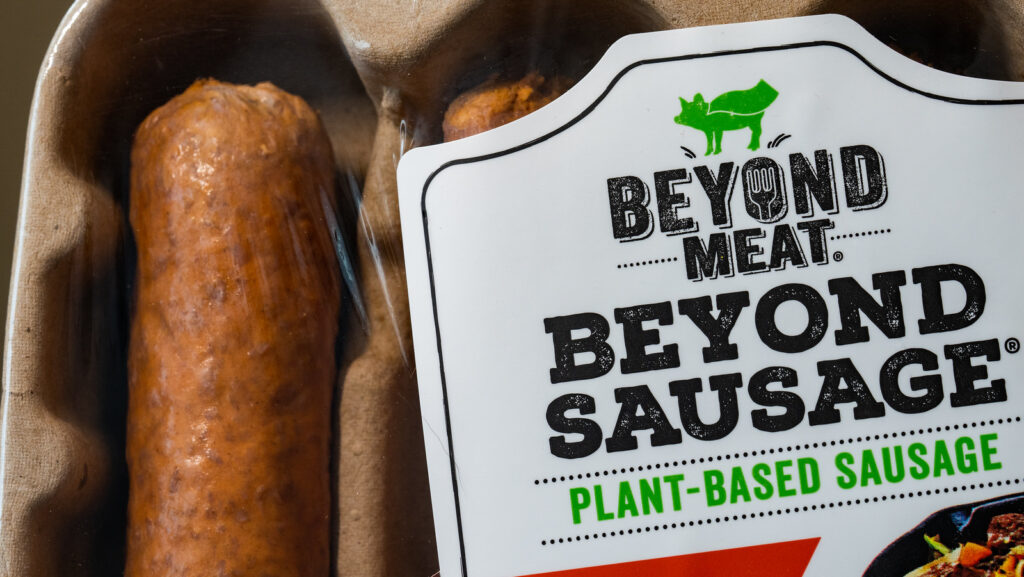Alice Baldan
Content warning: This article contains mention of dietary choices, calories and weight loss.
An increasing number of people are shifting further from meat consumption. With the number of ‘meat’ alternatives growing, could we ever live in a completely meatless world?
Due to evolving dietary norms, escalating environmental concerns, and a heightened focus on animal welfare, many people are switching to meat alternatives. The global population of vegans, vegetarians, and flexitarians is constantly increasing. Despite being an oddity less than fifty years ago, nearly a quarter of the world population now identify as vegetarians. What does this mean for the future of the meat industry?
Meat’s impact on our warming world
Meat is a staple ingredient in many people’s daily lives. The rapid population increase over the past few decades has led to a greater demand for meat, resulting in meat production tripling over the past 50 years. Globally, it is estimated that we consume around 350 million tons of meat per year.
This has had severe environmental consequences.
A recent study found that global food production is responsible for one-third of all greenhouse gasses emitted by humans, with meat production accounting for 57 per cent of all food emissions. One kilogram of beef generates around 70kg of planet-heating gasses.
https://twitter.com/peta/status/1693420237658444126
The problem with livestock is that they naturally produce significant amounts of methane as part of their digestive process. Methane is a greenhouse gas that is 80 times more damaging than carbon dioxide for the next 20 years after it is released. The transportation of these animals in trucks and other vehicles only further contributes to gas emissions.
Raising livestock requires a lot of feed and cattle ranching requires thousands of acres of land. This drives deforestation five times more than any other sector and meat production is estimated to be responsible for 70 per cent of deforestation in the Amazon rainforest.
On top of all of this, meat production contributes to the exhaustion of water, with one quarter-pound burger using around 1,500 litres.
The plant-based movement has boomed in response and those opting for meat alternatives are on the rise.
The rise of plant-based meat alternatives
Around a decade ago, the only plant-based options for vegetarians were tofu nuggets and lentil burgers. But there are now hundreds of companies, including Beyond Meat and Quorn, aiming to replicate the taste and consistency of meat. For many meat lovers, this makes the switch much easier than ever before.
Unlike the meat industry, plants have nowhere near the same climate impact.
In a study conducted by the University of Bath, it was revealed that plant-based foods emit up to 120 times less greenhouse gasses compared to beef. Compared to pork, the number is as much as 10 times less. Plant agriculture also uses around 37 per cent less water, and takes up less energy and land.
“Companies are working to bring meat cultivation into the market within the next couple of years”
The Good Food Institute stated that plant-based meats can be a better choice because they have “more fibre, less fat, and fewer calories than what people may otherwise eat.” Plant-based alternatives, therefore, can help reduce the risks of cardiovascular diseases, support gut health and help people maintain a healthy weight.
Despite this, critics argue that plant-based meats are highly processed and contain far higher levels of sodium than animal meat.
Are edible insects the future of meat?
While they may not sound appetising to those of us who are unfamiliar, insects have been a common edible delicacy in many global locations for a long time.
Of the 5.5 million known bug species, around 2,000 are consumed in 113 countries. Not only are insects a significant source of protein, they have also been linked to numerous health benefits. These include weight control, reduced blood sugar levels, and decreased cholesterol.
With human life expectancy growing and the world’s population continuously increasing, insects could be a sustainable protein source. They have the potential to reduce greenhouse gasses by 95 per cent and energy consumption by 62 per cent.
Given the numerous benefits, the United Nations Food and Agriculture Organization has urged greater initiatives to destigmatise the consumption of insects. But don’t worry, this doesn’t necessarily mean that we will eat them in their organic form — they can be mixed into flour, bars and biscuits.
The revolution of cultivated meat
Cultivated meat involves growing animal cells inside bioreactors to create real meat, replacing the practices of slaughtering animals. This practice may be familiar to gamers, having been introduced to the Sims 4 several years ago!
Animal cells are extracted and supplied with the essential nutrients to multiply and form muscle tissues. This eco-friendly substitute for conventional livestock farming tackles concerns about animal welfare, resource use, and the release of greenhouse gasses.
While this may sound like science fiction, many companies are working to bring meat cultivation into the market within the next couple of years.
A ‘meatless’ future?
It’s hard to determine whether the future will be completely ‘meatless’. But it is apparent that we are slowly moving in that direction, despite the ‘gigantic’ power of the meat industry. As the climate situation worsens and health concerns escalate, people are more motivated to reduce their meat consumption.
As proven by history, changes in dietary habits tend to happen slowly and gradually. Obviously, this drastic, but necessary, widespread change in behaviour will not happen overnight!
However, the growing momentum of meat alternatives, as well as the increasing awareness of their benefits, hint the transformative shift could happen sooner rather than later.
READ MORE:
-
THE BIRKIN EFFECT: THE PARASOCIAL IMPACT OF CELEBRITY DEATHS
-
DOOMSCROLLING: HOW TO BREAK THE VICIOUS CYCLE
-
CAN YOU SEPARATE THE ART FROM THE ARTIST?
Featured image courtesy of Tony Webster via Flickr. No changes were made to this image. Image licence found here.
